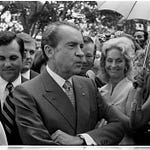
June 21, 1788.
New Hampshire becomes the ninth state to ratify the Constitution, activating the new government and binding America to a single compact.
Our Republic is dedicated to the premise that we are created equal. We fought a war to escape a king. We ratified a Constitution to rule ourselves. The Constitution is a contract between states. We can sum up the foundational basis of that contract in one word…
Trust.
Each sovereign state pledges to certify its vote and accept the certifications of every other. If that handshake fails, the Union fails.
Trust demands proof. How do we make every voter, every state official, and every member of Congress accept the tally as fact?
January 6, 2021
Tear gas. Pepper spray. Flashbang grenades.
The cameras didn’t miss a moment. Two thousand protesters from nearly every state turned into rioters. The floor of the House emptied. Staff members grabbed the mahogany boxes that, since 1877, have held the certified electoral votes of each state. They ran.
The count stopped.
Photojournalist and Marine veteran Chris Jones at the Capitol Building that day observed that “The looks in people’s eyes seemed religious to me, not political. So it was important for me to use that iconography in my pictures, to talk about how people do things for their faith that they wouldn’t do for their politics.”
For most Americans, the counting of votes had always been a formality. It wasn’t exciting. It wasn’t dramatic. It was supposed to be boring. That’s the point of a stable system.
But not on January 6.
The nation watched in horror as the institution of the American democratic Republic lost trust in itself.
That day, the count became the crisis. Some stormed the Capitol because they believed the tally was rigged. Others defended the building because they believed the tally was sacred. While the crisis was unfolding, a precious few, but enough, stood firm and did their duty to preserve the Republic. We owe them a debt of gratitude.
No matter our opinion of the facts of the legitimacy of the vote or the cause for the distrust. Either way, something broke. The numbers no longer spoke with authority. Many Americans believed they no longer trusted the count.
And the problem persists. In 2024, the FBI warned that foreign actors continue trying to undermine Americans’ trust in elections through disinformation. The fracture isn’t healing. It’s spreading.
Somewhere along the way, the foundation of the institution cracked.
January 6 wasn’t just an isolated moment of chaos. It revealed something deeper. Something dangerous. Trust in the vote itself fractured. That fracture didn’t heal when the building cleared. It’s a live threat today. Without trust, our elections lose their meaning. Without trust, our Republic crumbles from the inside.
Trust demands proof.
We Are One Nation Because We Are a Union of States
The Constitution isn’t a rulebook. It’s a contract between states that each state agreed to sign. As a part of the contract, New York agreed it would accept a certified count from Alabama. Wyoming agreed to trust the vote in California. Ohio agreed they can’t override Georgia’s tally just because it doesn’t like the outcome.
Article II, Section 1, Clause 2 of this Constitutional contract outlines that each state decides how to choose its electors, based on whatever method its legislature sets. Article I, Section 4, Clause 1 identifies that states and not a federal authority govern the times, places, and manner of their elections.
In short, states decide their vote. Not the federal government.
Congress does retain some authority to intervene and standardize practices to ensure consistency and protect voting rights, but only because the states amended the contract to give Congress this authority. Every state later agreed voting rights could not be denied by race (15th Amendment), sex (19th), failure to pay poll taxes (24th), or age over eighteen (26th).
Bottom line. Each state runs its own election. That’s not a flaw. That’s the design. When we ratified the Constitution, we had just fought with everything we had to win a war against a king, and we weren’t about to give the keys to another one.
We decided that no one person in Washington, or even a group of people, would manage elections. We gave that power to the states. But inherent in that power is responsibility. States agreed that once a result was certified, the rest of the country would accept it.
We didn’t personally sign the Constitution, but every Election Day, we delegate our voice to whoever wins, and we live with their choices. That’s representative governance. Institutions endure because each generation inherits them unless it chooses to dismantle them. Without that carry-forward consent, fifty states would drift apart and the Union would fracture. Trust in the contract, then, is necessary for national survival.
When one state casts doubt on another’s election, or when Congress or the President threaten to reject results a state has already decided, the entire structure starts to crack.
The states don’t all have to agree. We never could anyway. But we have to trust each other and accept the vote from other states. Without trust, the contract collapses.
Trust demands proof. How would we prove the results of elections?
The Technology Test
With mass elections, we face two different vulnerabilities. Both are technology-based. There is paper, and there are machines.
Some call to rely on paper ballots. But paper ballots, counted by hand or scanned, carry a human burden. Humans make lots of mistakes. We are slow. We scale poorly. We are prone to fatigue, bias, and clerical error.
The weakness of paper ballots isn’t in the vote itself; it’s in the count. Large-scale studies show hand counts differ half a percent to two percent from audited totals. Some one-off experiments collapse entirely. Nye County, Nevada’s 2022 “full hand count” logged a discrepancy of nearly twenty-five percent between manual and machine tallies before the state shut it down. Even the low end, half a percent, would swing 25,000 votes in a five-million-ballot state. That gap alone can decide a close race. In the 2020 election, President Biden won the vote in the state of Georgia by 12,000 votes. Arizona, 10,000. Wisconsin, 20,000. Trust demands proof.
The more complex the recount, the more faith we have to place in people. Humans perform poorly on repetitive, tedious tasks.
So, if we want to maintain trust, a human count isn’t proof.
Digital machines offer a different problem. They are fast. They scale beautifully. But their weakness is perception. They aren’t transparent.
If they’re connected to the internet even once, they open the door to doubt. A single confirmed breach, or even a plausible story of one, is enough to rupture confidence. If people believe the machines can be tampered with, they no longer trust the count. A machine count where we can’t see behind the curtain isn’t proof.
So we have a tradeoff. Paper risks accuracy and timeliness. Machines risk legitimacy.
Both fail the test because they can’t answer the central question.
Can they prove the result?
Maybe there’s another way. Trust demands proof. To fix trust, we need a new standard. One that we already apply when the stakes are life or death.
I Am Become Death, the Destroyer of Worlds
Few systems achieve the high standard of societal trust. These systems have zero‑failure tolerance because the stakes are civilization‑level.
Let’s think about how we certify weapons platforms that carry nuclear warheads. Each platform must achieve nuclear certification before it becomes active.
Nuclear certification isn’t a casual process. We subject those systems to a standard of review that assumes one tiny mistake could end civilization. When the cost of failure is existential, that system must meet a no-failure bar. Every bolt, every microchip, every software patch.
The standard is a transparent reliability rate of fewer than one error in one billion events. The 1-in-1-billion benchmark is not a metaphor; it comes straight from official federal nuclear safety guidelines. DOE Order 452.1F and DOD guidance require that the probability of an accidental or unauthorized nuclear detonation remain below this threshold.
If our election system counted 160 million votes with the same reliability, it would permit fewer than one single miscounted ballot. Practically zero. “Good-enough” paper or opaque machines fall short. That is the cost of keeping legitimacy non-negotiable.
The nuclear certification process is slow, rigorous, and unforgiving. Why? Because when the stakes are existential, “good enough” isn’t enough.
An election collapse threatens the Republic with equal finality. Once voters stop trusting the count, they stop trusting the system. At that point, we’re not debating the process. Just like we did on January 6, 2021, we watch in horror as some challenge the continuity of the Republic itself.
In short, instead of choosing between paper ballots and machines that count behind a curtain, we should hold vote-counting systems to the same standard we use for nuclear weapons platforms.
A nuclear weapons-grade election system means air-gapped hardware that’s never connected to the internet. No remote access, ever. Open-source, frozen code base. An immutable paper backup for every ballot. A public, mathematically verifiable audit trail. Continuous independent surveillance and testing. Tamper detection alerts. A public record briefing to each state’s election body detailing every abnormal event. Full transparency.
Engineers test, states see the data, and voters can download the report. A continuous loop from opaque process to transparent, verifiable record.
No more challenging the legitimacy of elections.
No more threatening the legitimacy of the Republic.
Results everyone can see and prove. Trust demands proof. If we already use this zero-failure standard to protect lives, shouldn’t we use it to protect our democratic Republic itself?
If the Republic lives on trust, shouldn’t trust deserve our decisive effort?
Yes, a zero-failure system is expensive. But the question is bigger than price.
We already spend fortunes to protect the Republic’s borders. We should spend what it takes to protect the Republic’s integrity.
Preserving the Union is our first national goal. That Union lives or dies on public faith in the count. Lose that faith, and no army can save us.
Union is not the absence of conflict; it is the shared burden of conflict. We win and lose together, and we accept the result together.
Union depends on trust. Without trust, we risk permanent fracture.
Trust demands proof.
May God bless the United States of America.
Music from #Uppbeat
https://uppbeat.io/t/simon-folwar/mornings
License code: OFHOYTZTU6ZNPVES













Share this post